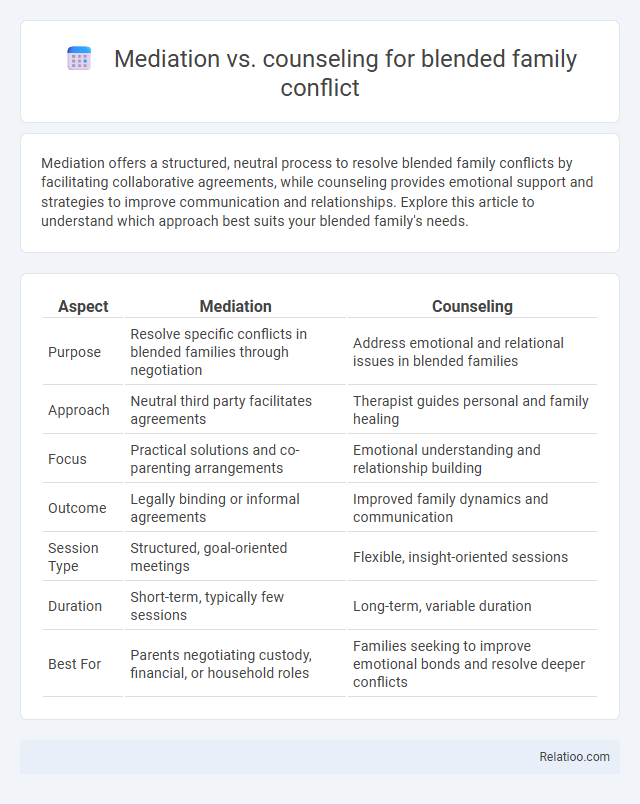Mediation offers a structured, neutral process to resolve blended family conflicts by facilitating collaborative agreements, while counseling provides emotional support and strategies to improve communication and relationships. Explore this article to understand which approach best suits your blended family's needs.
Table of Comparison
| Aspect | Mediation | Counseling |
|---|---|---|
| Purpose | Resolve specific conflicts in blended families through negotiation | Address emotional and relational issues in blended families |
| Approach | Neutral third party facilitates agreements | Therapist guides personal and family healing |
| Focus | Practical solutions and co-parenting arrangements | Emotional understanding and relationship building |
| Outcome | Legally binding or informal agreements | Improved family dynamics and communication |
| Session Type | Structured, goal-oriented meetings | Flexible, insight-oriented sessions |
| Duration | Short-term, typically few sessions | Long-term, variable duration |
| Best For | Parents negotiating custody, financial, or household roles | Families seeking to improve emotional bonds and resolve deeper conflicts |
Understanding Blended Family Conflicts
Mediation and counseling both address blended family conflicts but serve different roles; mediation focuses on facilitating negotiation and resolving specific disputes, while counseling emphasizes understanding the emotional dynamics and communication patterns within the blended family. Effective counseling for blended families targets complex issues like loyalty struggles, parenting challenges, and stepfamily integration by fostering empathy and conflict resolution skills. Research highlights that counseling improves family cohesion by addressing underlying emotional conflicts, whereas mediation primarily provides structured agreement solutions.
What is Mediation in Blended Families?
Mediation in blended families is a structured process where an impartial mediator helps family members resolve conflicts collaboratively, focusing on communication and mutually agreeable solutions. This approach contrasts with traditional counseling, which often centers on individual or family therapy to address emotional and psychological issues. You can benefit from mediation by fostering cooperation and clear agreements in blended family dynamics without the emotional intensity typical of counseling sessions.
Counseling Explained: A Guide for Blended Families
Counseling for blended families addresses complex emotional dynamics and communication challenges by providing personalized support tailored to your unique family structure. Unlike mediation, which focuses on resolving specific conflicts or disputes with neutral facilitation, counseling fosters deeper understanding, emotional healing, and long-term strategies for blended family cohesion. Your blended family benefits from counseling that explores underlying issues, promotes empathy, and builds stronger relationships beyond immediate conflict resolution.
Key Differences Between Mediation and Counseling
Mediation and counseling serve distinct roles in resolving blended family conflicts; mediation focuses on facilitating agreements between parties through a neutral third party, while counseling addresses underlying emotional issues and fosters communication skills. Mediation aims to reach practical solutions quickly by navigating specific disputes, whereas counseling provides long-term support for personal growth and relational healing. Your choice depends on whether you need structured conflict resolution or deeper emotional understanding within the blended family dynamic.
When to Choose Mediation for Family Disputes
Mediation for blended family conflicts is ideal when you seek a structured, neutral environment to negotiate parenting plans or financial agreements without court involvement. Your willingness to collaborate and resolve disputes amicably makes mediation a practical choice, especially when communication remains open but emotions are heightened. Counseling focuses more on emotional healing and relationship dynamics, whereas mediation targets practical solutions and legally binding agreements.
When Counseling is the Better Option
Counseling is the better option for blended family conflict when deep emotional issues, long-standing resentments, and individual mental health concerns need to be addressed comprehensively. Unlike mediation, which focuses primarily on negotiation and conflict resolution, counseling provides ongoing therapeutic support that helps family members develop healthy communication skills and emotional understanding. If your blended family's challenges stem from complex relational dynamics rather than just specific disputes, counseling offers a more effective and lasting solution.
Benefits of Mediation in Blended Family Conflicts
Mediation offers a collaborative approach to resolving blended family conflicts by promoting open communication and mutual understanding, which can reduce tension and foster cooperation among family members. Your blended family benefits from a structured, neutral environment where all voices are heard, leading to tailored agreements that prioritize everyone's needs without the adversarial nature often found in traditional counseling. This process often results in faster, more cost-effective resolutions and helps build lasting relationships by empowering you to actively participate in creating solutions.
Advantages of Counseling in Blended Family Issues
Counseling offers personalized strategies tailored to the unique dynamics of blended families, fostering effective communication and emotional healing. It provides a safe space for all family members to express concerns and build trust, promoting long-term harmony. Compared to mediation, counseling addresses underlying emotional challenges, supporting sustainable relationship growth within blended family structures.
Factors to Consider: Mediation or Counseling?
Choosing between mediation and counseling for blended family conflict involves evaluating factors such as the level of disagreement, communication patterns, and desired outcomes. Mediation works best when parties seek structured negotiation to resolve specific disputes, while counseling supports emotional healing and relationship-building among family members. Consider the family's willingness to collaborate, the complexity of issues, and the need for ongoing support when deciding the appropriate approach.
Finding the Right Support for Your Blended Family
Mediation offers structured conflict resolution by facilitating open dialogue and agreements between blended family members, while counseling provides emotional support and therapeutic strategies to address underlying issues and improve relationships. Selecting the right support depends on the family's specific needs, whether prioritizing practical solutions or deeper emotional healing. Combining mediation and counseling can create a comprehensive approach to managing blended family dynamics effectively.

Infographic: Mediation vs counseling for blended family conflict
 relatioo.com
relatioo.com